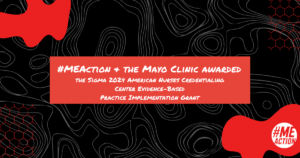Australia’s National Health and Medical Research Council (NHMRC) – the Australian equivalent of the US National Institutes of Health – has announced the establishment of an ME/CFS Advisory Committee to advise NHMRC’s CEO, Professor Anne Kelso, on current needs for research into ME/CFS, as well as clinical guidance on the diagnosis and treatment of the illness. The committee will sit for one year.
Terms of Reference
The Committee will advise the Chief Executive Officer of NHMRC on:
1. Status of national and international research into ME/CFS.
2. Gaps in research on ME/CFS. This will include but not be limited to research on the immunology, psychology, microbiology and virology of the conditions, as well as any health services research.
3. Status of clinical guidance on ME/CFS available to doctors and health professionals.
4. Requirements and opportunities for improved clinical guidance.
5. Any other issue on ME/CFS that the NHMRC Chief Executive Officer may request.
The committee includes diverse representation with some strong allies. Significantly, the committee also includes two consumer representatives. This is the first time that patient advocates have had a seat at the table in Australia. The two consumer representatives are both well known within the Australian ME/CFS community, and are administrators of #MEAction Network Australia: Penelope McMillan was invited as President of ME/CFS Australia (SA), the organisation which initiated this process with a proposal for a Targeted Call for Research in 2016. Emerge Australia was also invited to nominate a consumer representative, and have chosen Simone Eyssens. Sally Missing and Emerge Australia will provide support to Simone, in order to minimise the impact of this role on her health.
The establishment of this advisory committee is a big step forward for ME/CFS advocacy in Australia. NHMRC has never had an advisory committee for ME/CFS before, and it is significant that the patient voice has also been included. NHMRC has been receptive to the input of the community during the process that led to the establishment of the committee, and we are hopeful that this represents a genuine want by NHMRC to understand the illness (and the needs of those who live with it) better.
This committee also represents a significant achievement for ME/CFS advocacy in Australia, as it is the culmination of efforts from several organisations and individuals, including: ME/CFS Australia (SA), #MEAction Network Australia, Emerge Australia, ME/CFS Australia Ltd, ME/CFS & Lyme Association of WA, and ME/CFS & FM Association of NSW.
This committee represents a major opportunity for change for people with ME/CFS in Australia, and we are excited by the possibilities that it brings.
The #MEAction Network Australia Facebook page will be providing updates on the committee’s processes (as much as is possible) over the coming year.
Read more about this announcement and the committee.

Community is Key
#MEAction knows COMMUNITY IS KEY! It is through community that we find strength and feel fully seen and heard by others who know our struggles. When challenges come our way, this community has shown us over and over again that we are stronger together. “#MEAction’s community has made sense of this nonsense world of chronic





4 thoughts on “Australia Announces a New ME/CFS Advisory Committee”
It’s good to put this in a positive light, but it’s also important to understand that not everyone on the committee is sympathetic to the idea that ME/CFS is has a biological cause.
Professor Andrew Lloyd is responsible for the GET/CBT study at UNSW, whose clinic is using that as a treatment.
https://medicalsciences.med.unsw.edu.au/community/lifestyle-clinic/services/fatigue-clinic
Associate Professor Suzanne Broadbent – Exercise Scientist and Accredited Exercise Physiologist; – Chronic Fatigue Syndrome/ME exercise management, intermittent and graded exercise
https://www.usc.edu.au/explore/structure/faculty-of-science-health-education-and-engineering/staff/associate-professor-suzanne-broadbent
It’s to be expected that the government would want to include those who support the BPS model as a cause for ME/CFS to ‘balance’ the opinion of the committee. Hopefully, logic will prevail in the end…
GET/CBT r no longer endorsed by CDC, now removed from website, shown to be harmful for PwME. UK patients r petitioning NICE to remove..why aren’t we?
Glad we have patient reps. How to dispatch GET/CBT?
I have voiced my disapproval to them concerning the inclusion of the committee members who support exercise, but l didn’t receive a reply.
Earlier l wrote to Prof Kelso concerning the lack of funding for ME research and she replied.
Due to a former politician, Scott Ludlum who raised the issue of funding and his follow ups, we now have an increase in research funding.
Comments are closed.